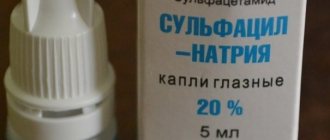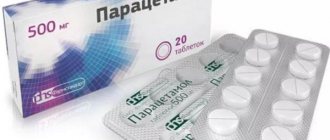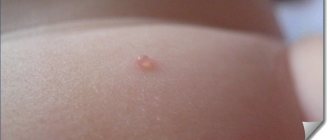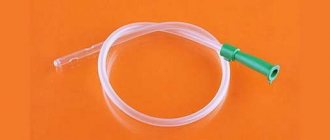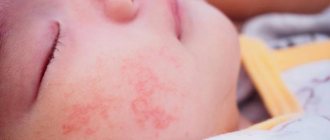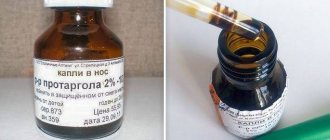Antipyretic for newborns from the first days - our rating
Medicinal antipyretics are not recommended for use in newborns from the first days of life until one month.
There are no pharmaceutical drugs whose annotations would indicate the possibility of using them in children under one month of age.
For older children, there are a number of safe medications that can successfully reduce high fever. They can be given to a child only after consultation and prescription by a doctor.
How to bring down the temperature of newborns up to a month
A high temperature is a sign of illness or illness in a child. If there is a high temperature, you should definitely call a pediatrician so that he can examine the child and find out the cause.
Reducing the temperature to 38 degrees is not recommended; it signals the body that it needs to start fighting pathogenic bacteria or viruses.
There are no approved antipyretics on the pharmaceutical market for newborns up to 1 month. The pediatrician may prescribe some kind of drug designed for older ages, taking into account the baby’s condition and reducing the dosage.
Prescribing and giving medicine to a child under one month old on your own is dangerous for his health.
How to bring down the temperature of babies under one month of age:
- the baby is undressed so that the skin cools and breathes as much as possible;
- the child’s room needs to be ventilated and the air humidified;
- You can wipe the baby’s body with water at room temperature.
It is important to ensure that the body does not become dehydrated due to temperature; to do this, put your baby to the breast more often. If the temperature does not go down, continues to rise, the baby is weak and drowsy - call an ambulance.
In what form are antipyretic drugs available for children?
For children aged 1 month and older, antipyretics are produced in solid and liquid form. The solid form - candles (suppositories) - although unpleasant for the child, has a number of advantages:
- when used correctly, it is easy and quick to administer;
- There are no unnecessary dyes, sweeteners or flavors that can cause allergies.
Disadvantages of rectal suppositories:
- must be stored in the refrigerator;
- act more slowly than syrup or suspension;
- cannot be used if there are intestinal pathologies.
The good thing about the syrup is that it starts to act faster than rectal suppositories. But its main drawback: the presence of dyes, flavors, and sweeteners to improve taste. These components can cause allergies in the baby.
List of approved antipyretics for children under one year of age
All antipyretics approved for use are divided into groups according to the active substance. For fever, the newborn is given the following medications:
- Preparations based on paracetamol.
They are approved for use from one month of age. Available in the form of candles, suspensions, syrups. Contraindicated for children with kidney disease, liver disease, viral hepatitis or diabetes mellitus. Popular drugs based on paracetamol are “Efferalgan”, “Paracetamol”, “Panadol”, “Cefekon D”. - Preparations based on ibuprofen.
Approved for use from the third month of a child’s life. Contraindicated for kidney disease, liver disease, asthma, ulcers, gastritis, hearing loss, and blood diseases. Popular drugs based on ibuprofen are “Ibufen”, “Nurofen”, “Ibuprofen”. - Homeopathic medicines.
Available in the form of rectal suppositories. Contraindicated in case of intolerance to the components. A popular drug is Viburkol.
Antipyretics in the form of rectal suppositories based on paracetamol
Antipyretics in the form of suppositories are good for their minimal number of side effects. Pediatricians often prescribe this form for children from one month old. Rectal suppositories based on paracetamol:
- "Panadol";
- "Cefekon D";
- "Efferalgan."
Rectal suppositories "Panadol"
Suppositories for babies up to one year old are produced in a dosage of 125 mg. They are prescribed to cope with mild to moderate pain and reduce high fever. The medicine lasts up to 6 hours.
The dosage is prescribed by the doctor, taking into account the weight and age of the baby. Usually no more than 4 candles are placed per day. These suppositories are often recommended on the day of vaccination if the child develops a fever as a reaction to the effects of the vaccine.
The drug is prescribed from 3 months.
Rectal suppositories "Cefekon D"
Available in a dosage of 50 mg for children aged one month. Children from 3 months are prescribed a dosage of 100 mg. The drug relieves pain well and reduces fever.
Rectal suppositories "Efferalgan"
Suppositories are prescribed for severe inflammation, teething, and prevention of fever after vaccination. Approved for use by children from 3 months. The dosage is calculated based on the baby's weight. Administer up to four times a day.
Antipyretics in the form of syrup and suspension based on paracetamol
From three months, paracetamol is given to newborns in a dosage of 60-120 mg. Paracetamol-based drugs can be used no more than four times a day. Popular liquid paracetamol-based preparations:
- Panadol suspension;
- Efferalgan syrup.
Suspension "Panadol"
Prescribed at the rate of 4 ml - for body weight from 6 to 8 kg and 5 ml - for body weight from 8 to 10 kg. Children under 3 months are given only as prescribed by a doctor. It is recommended to give the baby no more than 3-4 times a day.
Syrup "Efferalgan"
The syrup is not recommended for newborns weighing up to 4 kg. Dosed according to the baby's weight. Take no more than 3-4 times a day. The minimum time between doses is from 4 to 6 hours. The maximum period of use is three days.
Antipyretics recommended for newborns from one to three months
Pediatricians prescribe only paracetamol-based drugs for children under three months of age. The list of antipyretics recommended by doctors for newborns up to 3 months includes:
- rectal suppositories "Panadol";
- rectal suppositories "Cefekon D";
- rectal suppositories "Efferalgan";
- Panadol suspension;
- Efferalgan syrup.
Antipyretic suppositories and suspensions based on ibuprofen
Children aged three months and older can use not only paracetamol, but also ibuprofen-based medications.
Rectal suppositories "Nurofen"
Can be used by children from three months of age. Each suppository contains 60 mg of ibuprofen. Children weighing from 6 to 8 kg are prescribed 0.5-1 suppository up to three times a day. Children weighing from 8.5 kg to 12 kg are prescribed 1 suppository up to four times a day.
Suspension "Nurofen"
Not recommended for babies weighing less than 5 kg. For precise dosage, use a measuring spoon. At the age of 3 to 6 months, give 2.5 ml one to three times a day. At the age of 6 to 12 months, give 2.5 ml one to four times a day. Duration of treatment: 3 days. If children 3-6 months old do not improve within 24 hours after taking it, you should contact your pediatrician.
What drugs should not be used
Newborns should not be given a number of drugs that are good at reducing fever in adults, but are dangerous for children:
- “Aspirin” - it should not be used by children under 12 years of age;
- "Analgin" - it is used only in extreme cases, under the supervision of a doctor;
- “Ibuklin Junior” is a combination product that contains both ibuprofen and paracetamol, it is allowed to be used only from three years of age;
- "Phenacetin";
- "Amidopyrine";
- "Nimesulide";
- "Antipyrine".
How to additionally reduce the temperature in young children
Simple, proven steps can help young children bring down a high fever faster:
- Make sure your baby drinks enough. When a child sweats, this is a natural defense against overheating. The liquid helps remove toxins and protects against blood thickening and dehydration.
- Undress the child, cover only with a thin diaper.
- Ventilate the room periodically and ensure that the room is not too hot.
- Dry the child carefully with a damp towel, avoiding hypothermia (to avoid vascular spasms).
Before using an antipyretic, you should consult your pediatrician. After you have selected the optimal drug for your child from your own experience, make sure that you always have it at home. It is best to store antipyretics in the refrigerator.
Health to you and your baby!
0
0
39518
Source: https://littleone.com/publication/0-6640-zharoponizhayushchee-dlya-novorozhdennyh-s-pervyh-dney-zhizni-sushchestvuyut-li-oni
Antipyretics for newborns - effective methods - My child
Medicinal antipyretics are not recommended for use in newborns from the first days of life until one month.
There are no pharmaceutical drugs whose annotations would indicate the possibility of using them in children under one month of age.
For older children, there are a number of safe medications that can successfully reduce high fever. They can be given to a child only after consultation and prescription by a doctor.
Antipyretic for newborns from the first days of life
The temperature rises when the body is in danger, as a reaction of the immune system to infection. But how can a newborn child knock it down ? Here's what modern experts write about it. An increase in a baby's temperature has always frightened parents.
Especially if it is their first child. Moreover, it is quite difficult to choose an antipyretic for newborns from the first days of life. After all, what helps adults is dangerous to give to infants .
Here are some modern means that lower the temperature that can be given to newborn children.
What antipyretics can newborns use?
It's best to do without them. However, if you have no alternative, you need to choose special medications for infants based on ibuprofen or paracetamol at the pharmacy. For infants, there are forms such as special suppositories and syrups for fever.
The most popular is syrup for newborns . It is almost immediately absorbed into the blood and within 4 hours the temperature drops. The dispenser is very convenient and easy to use. The only drawback of syrups for temperature may be the allergens-dyes that they contain.
Therefore, you need to carefully choose such a remedy for newborns . Although paracetamol-based preparations for babies under 1 month do not contain any additives and are well tolerated.
The only drawback is that they are difficult to get at the pharmacy due to their lower cost than similar drugs.
Candles are less comfortable for a child to use. But they last longer than syrups. Moreover, the newborn may begin to burp or simply regurgitate the syrup and it will have almost no effect.
Therefore, parents who are expecting the birth of a baby should also buy candles at the pharmacy. Candles can be used already in the first days of life and they are very good at helping to reduce the temperature .
Important Note: Many medications are labeled as being suitable for use in children as young as 4 months of age. In fact, they are also given to infants in a reduced dosage.
True, it is worth consulting with a specific pediatrician who, knowing the child’s condition, will tell you which medications are suitable for him. These antipyretics are worth looking at at the pharmacy for your child.
But remember that many drugs can cause allergies , so they need to be given in doses, first as a test, then in full form.
And, of course, monitor the general condition of your baby. If the temperature drops well and does not reach a high level after 4 hours, then it is a common cold. If the temperature not only rises quickly, but continues to rise, you should urgently call a doctor . He will determine the child’s diagnosis and prescribe special anti-infection medications.
Material on the topic: Rotovirus intestinal infection symptoms and treatment in children
At what temperature should a newborn be given an antipyretic?
Fearing illness, parents begin to give their infant various antipyretics. Yes, they bring down the temperature, but this method of fighting the disease can negatively affect children's immunity . A high temperature during illness is a normal and natural reaction of a child’s immune system.
When it increases, the baby’s body begins to produce interferon, a special protein that promotes natural immunity. Therefore, if the temperature does not rise above 38 degrees, it is not worth bringing it down . Children's immunity will cope with the disease and will gradually strengthen.
But you also need to look at the general condition of the child, since different children tolerate the temperature differently. Some children are simply hot, but at the same time they do not have lethargy or increased anxiety. Others do not tolerate high temperatures well.
And, if you notice increased drowsiness, anxiety, convulsions and other symptoms, it is better not to self-medicate, but to call an ambulance .
Especially if, even after taking antipyretic drugs, the temperature does not drop for long and quickly rises even higher. Children's antipyretics can only temporarily alleviate the child's condition if the immune system itself cannot cope with the infection.
Source: https://pavsanatoriy.ru/beremennost-i-rody/zharoponizhayushhie-sredstva-dlya-novorozhdennyh-effektivnye-sposoby.html
Antipyretic drugs for newborns and infants up to 1 year – Topotushki
An increase in temperature in an infant is almost always a signal of trouble in a small organism, the cause of which can be either a disease or a reaction to vaccination or teething. Antipyretic drugs will help alleviate the child's condition at high temperatures.
Dosage forms of antipyretics for newborns
- Liquid form. Presented in syrups and suspensions. Using a measuring spoon or the included device with a piston, dose the drug.
- Solid form. Candles (suppositories).
They are selected depending on the dosage of the antipyretic drug.
Candles and suppositories are inserted into the child's rectum. Syrups and suspensions are administered orally, according to the dosage recommended by the doctor.
List of antipyretics for children under one year of age
All modern antipyretics belong to a specific group based on the type of active substance. Good antipyretics include:
- paracetamol-based products (Efferalgan, Panadol, Paracetamol). They can be produced in the form of rectal tablets or suppositories, suspensions. Contraindicated for patients with liver disease, kidney disease, viral hepatitis, diabetes mellitus;
- medications that contain ibuprofen (Nurofen, Ibuprofen, Ibufen). Approved for use only from the third month of the baby’s life. They cannot be used for asthma, liver disease, kidney disease, hearing impairment, blood disease, ulcers, gastritis;
- homeopathic group of antipyretic drugs (Viburkol). Presented in the form of rectal suppositories. They have no age restrictions. They cannot be used if the components are intolerant.
Important! An antipyretic for a newborn (up to 1 month) from birth is prescribed exclusively by a pediatrician. Self-administration of the drug is dangerous due to overdose and side effects.
Next, we will look at which antipyretics are best to choose, taking into account their characteristics.
Antipyretic suppositories for newborns up to 1 year
The main advantage of antipyretic suppositories is the lower number of side effects compared to the liquid form. Suppositories are absorbed through the rectal mucosa without affecting the digestive tract. Flavorings and dyes are added to syrups. This dosage form may cause an allergic reaction in infants prone to allergies.
Antipyretic suppositories based on paracetamol
Candles Tsefekon D
Approved for use from 1 month of age.
- children weighing 4 – 6 kg (child’s age 1 – 3 months) – 1 suppository 50 mg;
- infants weighing 7 - 12 kg (child's age 3 -12 months) - 1 suppository 100 mg.
Apply no more than 3 times per day. The interval between doses is 4 – 6 hours.
Panadol suppositories
For a child under one year of age, it is necessary to purchase suppositories with a dosage of 125 mg of paracetamol in one suppository. Allowed for children from 6 months in a dosage of one suppository. It is allowed to place no more than 4 candles per day with 4-hour breaks. You can use it for 5-7 days. Panadol has an analgesic and antipyretic effect.
Antipyretic suppositories based on ibuprofen
Nurofen suppositories
Used from three months of age. One suppository contains 60 mg of ibuprofen. It is allowed to use the drug after 6 hours.
- children weighing 6 - 8 kg are prescribed 0.5 - 1 suppository no more than 3 times a day;
- if the baby's weight is 8.5 - 12 kg, 1 suppository is prescribed no more than 4 times a day.
Suspensions and syrups for children from one month to 1 year
There is often confusion with the name of liquid antipyretic drugs for children in terms of classifying them as syrups or suspensions.
The basis of syrups is a concentrated aqueous solution of sucrose and/or its substitutes, and suspensions are a liquid medium in which particles of the active substance are distributed in suspension.
Over time, with prolonged standing, these particles can settle to the bottom, so the suspension must be shaken before using.
Both taste sweet, but in syrups the sweetness is mostly due to sugar (most often sucrose), and in suspensions, sweeteners (for example maltitol) and/or sweeteners, much less often sucrose. Sweeteners are able to be absorbed by the body because they provide energy value, while sweeteners are substances that are not a source of energy, although they taste sweet. Therefore, if a child is prone to allergies, it is better to choose a product that does not contain sucrose.
Antipyretic suspensions based on ibuprofen
Used from three months of age. It is allowed to use the drug after 6 hours.
Suspension Nurofen
Analogues are Ibuprofen suspension, Ibufen suspension, Bofen suspension.
How to give:
- infants 3–6 months old weighing at least 5 kg are prescribed 2.5 ml 1–3 times a day;
- if the child's age is from 6 months to 1 year, use 2.5 ml 1 - 4 times a day.
Antipyretic suspensions and syrups based on paracetamol
Children from 3 months to one year can take 60-120 mg of paracetamol at a time. If the child has not yet reached three months, then the dose is calculated based on the child’s weight - 10 mg per kilogram. It cannot be used more than 4 times a day. Children under 3 months. used only after medical prescription.
Panadol suspension
How to give:
- with a body weight of 6-8 kg, 4 ml of suspension is prescribed;
- 8-10 kg - 5 ml of Panadol suspension.
Efferalgan syrup
The dosage is carried out using a measuring spoon, on which divisions are marked corresponding to the child’s body weight, starting from 4 kg and up to 16 kg at intervals of one kilogram. All even numbers are marked, and odd numbers are divisions without a number. Medicines must be taken as much as the child weighs. If the child has not reached 4 kg, it is not recommended to use the drug.
Calpol suspension
An analogue is a suspension of Paracetamol for children.
At the age of three months to one year, give the child from 2.5 ml (child’s body weight 4-8 kg) to 5 ml (child’s body weight 8-16 kg) of the suspension. Contraindicated for children under one month.
Antipyretic drugs prohibited for infants
- Combined tablets containing ibuprofen and paracetamol (Ibuklin Junior tablets). They can be used for children over 3 years of age.
- Analgin. It is not used for children. It can be used as part of a lytic mixture if it is not possible to reduce the temperature for a long time by other methods. Used only in extreme cases, as prescribed by a doctor and in his presence.
- Aspirin. It should absolutely not be used to lower the temperature of children under 12 years of age. The drug is dangerous due to complications and the development of dangerous pathologies.
Important! It is strictly not recommended to deviate from age restrictions when choosing an antipyretic drug. The components in the drug may act differently and cause side effects.
For a developing organism, an inappropriately selected antipyretic can cause irreparable damage.
Additional methods for reducing fever
- Drink plenty of fluids. The baby is often placed on the mother's breast.
- Comfortable clothes. The child should not be wrapped up so as not to overheat further. However, there is no need to undress him completely.
- The room temperature should be + 18 + 20 C;
- If there is no vascular spasm, after consulting a doctor, the child can be wiped with warm water, but without vinegar in the composition!
With a slight increase in temperature of 37 - 37.5 C, you can do without antipyretic drugs.
But an examination by a pediatrician is required. The doctor will determine the cause of the fever and the absence of concomitant diseases.
At what temperature should you give an antipyretic to a child under one year old?
Normal indicators of a child’s body temperature from the first days of life vary between 37.0 – 37.5 C. After a few days, the indicators drop to 36.1 – 37.0 C. The usual temperature of 36.6 degrees is established by the first year of the baby’s life. The following numbers are considered normal:
- 36.0 – 37.3 C – in the armpit;
- 36.6 – 37.2 C – oral body temperature;
- 36.9 – 38.0 C – when measuring rectal temperature.
If after vaccination or during teething the child’s temperature rises above 37.5 C, doctors recommend giving an antipyretic. This temperature after vaccination does not contribute to the development of immunity (as is the case with ARVI), and there is no positive effect from it.
Therefore, you can give a safe antipyretic (according to age indications). In case of low-grade fever (about 37.0 C), instead of taking medication, it is better to take the additional measures described below to reduce the temperature.
If after vaccination there is no increase in temperature, then there is no need to give the baby an antipyretic, just in case.
Source: https://topotushky.ru/zdorove-malysha/preparaty/zharoponizhayushhie-dlya-novorozhdennyx.html
Candles
According to pediatricians, this dosage form is suitable for children from the first months of life. Suppositories for fever for infants do not contain additives harmful to the body, the drug does not irritate the mucous membrane of the gastrointestinal tract, does not cause an allergic reaction, and has a long-lasting effect. Rectal suppositories are an excellent choice for children whose fever causes vomiting because medications taken orally do not have time to take effect.
The effect occurs after about 40 minutes, so it is better to reduce very strong heat with syrup or suspension. Suppositories should not be used for diarrhea (diarrhea). Effective drugs: Nurofen, Cefekon D, Viburkol.
Tsefekon D
Rectal suppositories with paracetamol provide antipyretic and analgesic effects and eliminate inflammatory processes. Candles are allowed for children from 3 months. Cefekon begins to act 30–40 minutes after administration, the therapeutic effect lasts approximately 6–8 hours.
Articles on the topic
- Antipyretic suppositories for children and adults
- Antipyretic tablets: names of effective remedies
- Antibiotics for children - when prescribed, rules of use and release form
Suppositories effectively eliminate fever during influenza, childhood infections, after vaccination, ARVI (acute respiratory viral infection).
Cefekon D should not be taken if you are hypersensitive to paracetamol; it should not be given to a child under one month old weighing less than 4 kilograms. In case of overdose or individual intolerance to the constituent components of the drug, nausea, vomiting, and skin rashes are observed. The average cost of Tsefekon D suppositories is 40–60 rubles.
Nurofen
The medicine belongs to the group of NSAIDs (non-steroidal anti-inflammatory drugs). Ibuprofen-based Nurofen is prescribed to quickly reduce fever after vaccination, for influenza and ARVI, and has an analgesic effect. The maximum concentration of the drug in the body is achieved after 40–50 minutes. after administration, the effect lasts up to 6–8 hours.
Suppositories should not be used for infants under 1 month of age and weighing less than 6 kg. In rare cases (if the drug is used incorrectly), adverse reactions are possible: urticaria, swelling, dermatosis, headache, nausea. The approximate cost of Nurofen is 100 rubles.
Viburkol
Homeopathic suppositories relieve inflammation and spasms, pain, and calm the child. Viburkol begins to act 10–15 minutes after inserting the suppository into the rectum. The therapeutic effect lasts about 3–5 hours. Antipyretic suppositories are effective from birth for infectious childhood diseases, teething, and complications after vaccination.
Possible adverse reactions (rare) - skin rash, itching. Contraindications to the use of Viburkol: high sensitivity to the composition of the drug or intolerance to the components. The price of candles is 350–400 rubles.
The best antipyretics for children from 0 to 3 years old
The best antipyretics for children from 0 to 3 years old
A high temperature in a small child is an alarming signal that causes a lot of anxiety among parents. Most often, it is a protective reaction of the body to pathogens of a viral infection, although often hyperthermia can be a consequence of overheating, vaccination, or the cause of teething.
Read about the best antiviral drugs for children from 0 to 3 here.
When a child has a fever, any mother has a number of questions: should she immediately lower the temperature or wait for the doctor to come? Which antipyretic drug is most effective? Is it dangerous to give it to a baby? You will find the answers to them in this article.
When to lower the temperature
Many parents begin to really panic as soon as the thermometer shows a temperature above normal. They immediately begin to stuff the baby with antipyretics, which is not recommended.
The fact is that at a temperature of 38 degrees the body begins to fight the disease by producing interferon, which helps suppress infectious agents and strengthen the immune system.
Therefore, if you constantly “help” the immune system in the fight against the disease, then in the future it will “forget how” to do this on its own. When is it necessary to lower a child’s temperature?
· At the age of 0-3 months – when the temperature rises to 38 degrees;
· After reaching 3 months – at a temperature of 39 degrees or more;
· For diseases of the cardiovascular and respiratory systems – at 38.5;
· With dehydration (vomiting, diarrhea), febrile convulsions.
In any case, you should focus on the baby’s condition. If a child has a temperature of about 38 degrees, and he experiences weakness, drowsiness, lethargy, chills, difficulty breathing, vomiting, diarrhea, convulsions, paleness or redness of the skin, then you should not wait until the fever intensifies, but immediately give an antipyretic drug and induce doctor
Forms and types of antipyretics
Almost all antipyretic medicines for children contain ibuprofen or paracetamol, with the exception of homeopathic medicines containing herbal ingredients. Fever reducers come in different types and come in the form of:
1. Syrups, suspensions, mixtures - have a liquid form, a pleasant taste and smell. They are the fastest-acting antipyretics. The temperature begins to decrease within 20-30 minutes after taking the medicine. Can be used from 1 month.
2. Rectal suppositories (suppositories) - are considered the most convenient and effective remedy for fever, which begins to subside approximately 30-40 minutes after inserting the suppository into the rectum. However, if the baby has diarrhea, then this method is not suitable.
3. Dry powder - before taking, it should be dissolved in warm water. It has a sweet and sour taste and a pleasant aroma, so most often children drink the antipyretic drink without problems. Can be used in children after 6-9 months.
4. Tablets - mainly prescribed to children aged 3 years and older, since children do not know how to swallow them. If you still need to give your child a tablet, then it should first be crushed into powder and diluted in a small amount of liquid.
It is strictly not recommended to give antipyretic drugs to a baby under 1 month of age without a doctor’s permission. For children from 1 month to 2 years, it is preferable to use medications in the form of rectal suppositories and in liquid form (syrup, suspension, mixture). There are also drugs in the form of chewable tablets (lozenges), which are allowed for children from 2 years of age.
The most effective drugs with paracetamol
Medicines based on paracetamol are considered the most effective. They have analgesic and antipyretic effects. Used from 1-3 months for ARVI, ENT diseases, flu, colds, and teething. The best drugs to reduce fever include:
· Paracetamol (syrup, suspension, suppositories) – from 1-3 months. Reduce temperature for 4-6 hours. Use no more than 3-4 times a day;
· Panadol (suppositories, suspension, syrup) – from 3 months. Quickly reduces fever, eliminates pain and aches. Can be taken up to 3-4 times a day;
· Cefekon D (suppositories) – from 1 month. In a short period of time, the temperature is reduced and pain is relieved. Frequency of administration: every 4-6 hours;
· Efferalgan (suppositories, syrup) – from 1-3 months. It is allowed to take no more than 3 days, with a break between doses of at least 4-6 hours.
There are few contraindications to the use of such antipyretic drugs. They should not be given to children under 1 month of age with individual intolerance to paracetamol, with diabetes mellitus, kidney or liver pathologies, with Gilbert's syndrome, or viral hepatitis. If you do not exceed the specified dosage, side effects are rare.
The best antipyretic drugs with ibuprofen
Ibuprofen-based drugs are classified as non-steroidal anti-inflammatory drugs. Provide antipyretic and analgesic effects. They are mainly prescribed to children aged 3 months and older, with individual intolerance to paracetamol. Medicines quickly bring down the temperature and provide relief from colds and viral diseases. The most effective of them:
· Nurofen (syrup, suspension, suppositories) – from 3 months. The interval between doses is 6-8 hours;
· Ibuprofen (suppositories, tablets) – 3 months and older. Use no more than 3-4 times a day;
· Ibufen (suspension) – allowed for children from 1 year. Can be used up to 3-4 times a day.
You should not take antipyretic drugs with ibuprofen if you have an individual intolerance, allergic rhinitis, asthma, blood diseases (affects blood clotting), kidney, liver, stomach and duodenal diseases.
Homeopathic antipyretics
The best homeopathic remedy for reducing fever in children is Viburkol suppositories. This is a plant-based, complex-action drug. It can be used by infants from the first days of life.
It has antipyretic, anti-inflammatory, antispasmodic, analgesic and sedative effects. It has no side effects and has no contraindications.
The only limitation to the use of suppositories is individual intolerance to the components included in the composition.
What drugs should not be given to children
If a mother is going to buy an antipyretic drug without a doctor’s recommendation, first of all she should pay attention to the age indicated in the instructions, the active substance, contraindications, the speed and duration of the therapeutic effect. You cannot buy medicine for your baby if it contains nimesulide (Nimesil, Nise, Nimid, Nemulex), acetylsalicylic acid, drugs Aspirin, Analgin, Antipyrin, Amidopyrin, Phenacetin.
It should be remembered that many antipyretic drugs contain flavorings, sucrose, sweeteners and other additives that can provoke an allergic reaction.
Therefore, it is best to consult a pediatrician before purchasing a medicine, who will select the most effective and safe one, taking into account the age, weight of the baby, the nature of the disease and the individual characteristics of his body.
Useful tips
If a small child has a fever, call the pediatrician as soon as possible. Try not to wrap your baby up, let him drink plenty of warm liquids, and put your baby to your breast more often. The room should not be hot and stuffy, the optimal temperature is 18-22 degrees. The air in the room should be moist, cool and fresh; frequent ventilation will help with this.
Do not self-medicate for a long time, so as not to harm the baby’s health. Do not give antipyretic drugs to your child without the recommendation of a pediatrician. If the temperature is too high and you need to act immediately, read the instructions carefully before using the product and under no circumstances exceed the indicated dosage. Health to your children!
The best antipyretics for children from 0 to 3 years old. Anastasia Rzhevskaya for the website Papkina Daughter.
Source: https://papkinadochka.ru/obzory/luchshie-zharoponizhajushhie-sredstva-dlja-detej-ot-0-do-3-let/
The best antipyretic for babies
To avoid negative consequences, consider the rules for using an antipyretic drug for an infant:
- Reduce the temperature only when it rises above 38°C so that the child’s body can fight the infection on its own.
- Give your child only those medications prescribed by the pediatrician.
- Follow the instructions and recommendations of your doctor when using the medicine.
All antipyretics for newborns are divided into groups according to the active substance:
- Formulations with ibuprofen : tablets, rectal suppositories, syrups. They can be given to a child from 3 months. The drugs reduce temperature and have an anti-inflammatory effect.
- Paracetamol-based products are available in the same dosage forms. Allowed for children after 1 month.
- Homeopathic antipyretics for newborns (mainly suppositories) are considered the safest option for reducing fever. There are no age restrictions.
Paracetamol based
For fever caused by a bacterial or viral infection or teething, medications with paracetamol will help. Doctors use antipyretics for children under one year of age as an indicator to diagnose the cause and severity of the disease. If a child has the flu, fungal or bacterial infection, then the effect of paracetamol is weak and short-lived, but in case of viral pathologies it gives a quick, lasting effect.
With prolonged use of the drug and overdose, paracetamol negatively affects the stomach, liver, causes allergies and reduces hemoglobin concentration.
The effect of paracetamol is observed 40–60 minutes after administration, the effect lasts for approximately 4 hours.
The most popular products for newborns: Efferalgan and Panadol syrups. The duration of taking antipyretics is no more than 3 days. Contraindications: viral hepatitis, diabetes, allergies to the components of the drug.
With ibuprofen
Ibuprofen-based antipyretics reduce fever during flu, sore throat, otitis, pain in muscles and joints, teething and after vaccination. Popular drugs of this drug group are Ibuprofen, Nurofen, Ibufen. The effect after taking the medicine occurs within 20–30 minutes and lasts up to 6 hours. Antipyretics with ibuprofen should not be used if you have liver/renal failure, asthma, stomach ulcers, or blood diseases.
Homeopathic remedies
Such remedies include only natural herbal ingredients: belladonna, chamomile, plantain, bittersweet nightshade, meadow lumbago. The pediatrician prescribes homeopathy (mainly Viburkol suppositories) for painful teething in infants, heat and fever, convulsions, and ear inflammation.
The drugs are safe for the baby, but only if the dosage is correct. Homeopathic remedies relieve pain, eliminate heat and inflammation. It is not recommended to use if the baby is allergic to the composition of the drug.
